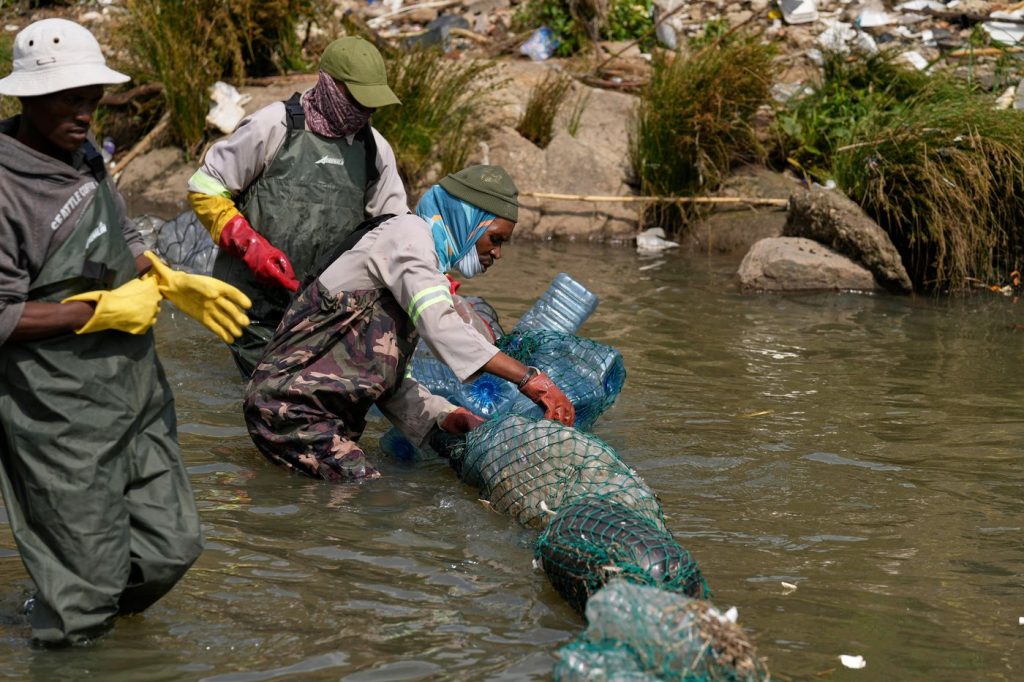In Johannesburg, South Africa’s oldest township, Alexandra, volunteers in wetsuits are actively working to untangle a damaged net designed to trap garbage in the polluted Jukskei River. Heavy rains had compromised the nets, and without them, low-lying areas in Alexandra could face significant flooding risks. The Jukskei River's condition is particularly concerning as Alexandria, housing over half a million residents, is in close proximity to Sandton, South Africa's wealthiest financial district. The flooding not only disrupts daily life but also poses a threat to children's access to education, as submerged bridges hinder their commute to schools, as noted by Semadi Manganye, a resident and co-founder of the Alexandra Water Warriors volunteer group.
The urgency of addressing climate issues affecting impoverished nations will be underscored this weekend when world leaders gather in Johannesburg for the first Group of 20 (G20) summit hosted in Africa. South Africa aims to prioritize challenges faced by poor countries, emphasizing the need for effective responses to disasters that have been exacerbated by climate change. The South African government is making appeals to wealthier nations and international finance institutions for increased assistance, a plea that also echoes in global climate discussions taking place in Brazil.
The Alexandra township's residents face stark contrasts in their living conditions compared to the affluent Sandton. Recent reports indicate that the poorest countries experienced nearly eight times as many natural disasters between 2010 and 2020 compared to a similar period in the past. The impacts of climate change can be felt acutely in Southern Africa, where potent tropical storms and extreme weather conditions have resulted in the loss of thousands of lives and have imposed vast reconstruction costs on affected nations. For instance, Cyclone Idai devastated Mozambique, Malawi, and Zimbabwe in 2019, causing approximately $2 billion in damages, a staggering amount for countries with limited economic resources.
In 2022, the El Nino weather phenomenon triggered one of the most severe droughts in the region in decades, compounding the already dire situation for small-scale farmers and further impoverishing communities. Climate financing has become a contentious topic in major international meetings, with rich nations agreeing to contribute $300 billion annually by 2035 to support developing countries in coping with climatic impacts. Nevertheless, experts contend that the required funding could exceed $1 trillion annually by 2030 to effectively respond to the challenges posed by climate change.
Notably absent from this G20 summit is the United States, following a boycott stemming from President Donald Trump’s discredited claims regarding South Africa’s treatment of its white minority. This absence raises doubts about the potential for substantial climate action or declarations emerging from the summit.
The Alexandra Water Warriors, established in 2021, consider themselves custodians of their environment. They are engaged in various initiatives, including planting native trees and undertaking river cleanups. However, they are faced with systemic challenges experienced by many townships in South Africa, a country grappling with profound inequalities despite being the continent's most developed economy. An Amnesty International report highlighted that around 5 million people live in informal settlements within South Africa, lacking adequate housing and services, making them increasingly vulnerable to climate-related catastrophes.
In June, floods in South Africa’s Eastern Cape claimed more than 100 lives, a disaster exacerbated not only by climate change but also by poor housing conditions and dilapidated infrastructure. Local communities, like that of the Alexandra Water Warriors, are supported by a private-public partnership that provides small stipends to approximately 3,000 individuals working on environmental projects, a program that has expanded from its original 250 members since its inception in 2022.
Vera Songwe, a former executive secretary of the U.N. Economic Commission for Africa, argues that building climate resilience should not just be a necessity but also a strategic approach for development. She emphasized that a commitment to green, sustainable growth could ultimately yield faster economic progress.
As the G20 summit takes place, the ongoing concerns of climate change, inequality, and their interrelations in developing regions, especially in Africa, remain at the forefront of discussions.











